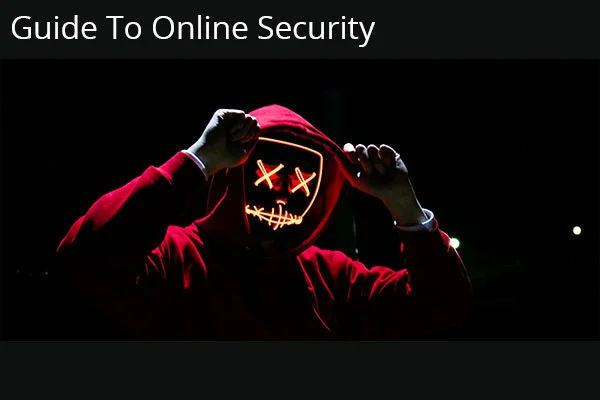Guide To Online Security
Get sober on these figures:
In 2021,
$63M
a revenue loss of $63, 136, 741, from
62, 895
reports of phishing
Top 3
the top 3 scams are phishing, identity theft and false billing
55-64
Australians aged 55-64 are the most vulnerable to online scams
Check the live data for yourself on Scamwatch >here.
Our data, devices and privacy might be infiltrated or hacked, but we can protect ourselves with simple online security habits each time we connect to the internet. It all starts with a cautious and weary mindset and the handiest Guide To Online Security ever. You’re welcome.
Healthy Paranoia
You can never be too paranoid or flippant about the internet and emails: paranoia when online is healthy.
Be weary when using public wifi links. Avoid making purchases or submitting personal and banking details.
Consider it better to be safe than sorry.
Privacy
There is such a thing as too much information - so take care with the information you share online.
The more information you share online, the greater the risk with the theft of your identity.
Always be mindful and careful of what you share, whether it’s uploading or tagging yourself on photos, answering those cute quizzes or posting private details from your life. Hackers can find answers to security questions just from the personal information you inadvertently share on the internet or across social media. Where possible, set your personal profile settings to private.
Passwords
Always lock your computer and devices with password access.
Create strong secure passwords:
Use minimum 6 x characters, 1 x capital letter, 1 x character, 1 x number
Consider combining aspirational phrases such as
$1MIL2020 or
Thebestairguitar123!
Install 2-Factor authentication where possible.
Download LastPass, 1Password or Roboform
as great password managers to your phone, desktop and Chrome to secure and manage your passwords.
Basic Email Security
Always treat email as a door into your personal space - which it is.
If you receive an email from someone you don’t know, treat with caution.
If something about an email strikes you as unusual - even from someone you correspond with frequently - it probably is.
Don't open email links or attachments if you're not expecting them. If in doubt, reply to the sender or call them directly to confirm the link, file or email is legit.
Check the reply-to email address:
When replying to an email, always carefully check the 'from email address' is the same as the email address you are replying to: there might be minute differences.
On Tue, Aug 14, 2018 at 9:23 AM, Tom Jones <tom@tomjones.com> wrote
Reply-To Tom Jones <tom@timjones.com>
or
On Tue, Aug 14, 2018 at 9:23 AM, Tom Jones <tom@tomjones.com> wrote
Reply-To Tom Jones <dodgyemailaddress@hotmail.com>
Don't always click on a hyperlink.
If you know the link is guaranteed to be safe, go ahead. But if you're not expecting the link from the person emailing you, reply email or call them to check "should I open this?"
When in doubt, hover with your mouse over any links in your email to read in the bottom left of your screen tab. Or paste and copy the link directly into your browser to see where it takes you.
Surf Safely
Download Chrome: other than allowing you to work 20% more efficiently, Chrome notifies you at a glance or a button whether the site or address is secure.
Here’s How To Check:
Look at the top left hand side of your browser, and whether the address displays as https (for secure) or http (for not secure)>
Secure = Good
Go forth for website happiness
Not Secure = #notsogood
Click through with care
Online Finances
Keep financial details secure: don’t trust anyone with the information except yourself, your mum, your bookkeeper and accountant.
Never click a banking or financial institution link from an email or your phone. Never.
Bookmark online banking and cloud programme URLs to your browser, so you don’t allow an email to take you to a dodgy website.
Download banking apps straight to your phone - where it will already be locked with a password…. right? #yes
Never log onto sensitive accounts such as your banking account or make purchases from public devices such as share computers and public wifi access spots which are not secure.
Log out of internet banking sessions and menus when you’re finished.
Deal with reliable online retailers you trust and have a relationship with.
Anytime your supplier requests changes of payments into a different bank account - especially for large invoices - call them or their accounts department directly. We can't assume they are changing bank accounts details - particularly as scammers become more elaborate and devious which Sage & Clare recently experienced. Make the call and read out the numbers across the phone to be reassured the money is going in the right direction.
Maintain an excellent relationship and consistent correspondence with your suppliers and their accounting staff. Extending the relationship beyond business and email means there's always good faith between you both.
By following these particular tips, you’ll likely be the amongst the first to know if anything changes (or goes wrong).
Back Up & Run Malwarebytes Frequently
Set up your data to back up automatically once a week.
Manually back up your data, laptops and devices to an external hard drive and the cloud every week.
Update apps regularly.
Download Malwarebytes and run every month. It’s free - so there’s no excuses. Malwarebytes looks after your PC or Mac, alerting you to any viruses and ridding them from your system.
Subscribe to haveibeenpwned.com
Gold Coast born Troy Hunt is a Microsoft Regional Director and acknowledged as one of the world’s top security developers. Subscribing to his website allows you to stay informed if your personal data has been compromised by data breaches.
Report Scams
Information is power: keep others safe by spreading the news when and how you’ve been scammed, so consider it a duty to the community when posting the grisly details across your own private social media posts.
If your business network is affected, take courage and phone or email your colleagues personally. Being hacked happens to everyone: it’s not a reflection on you that it happens; only when it happens you do something constructive about it.
Go Forth & Do Great Online Things
(Safely)
Need Digital Assistance?
I Can Help
Email Hosting • Social Media • Responsive Websites
google SEO • Online Marketing • e-Newsletters • Ebooks


















